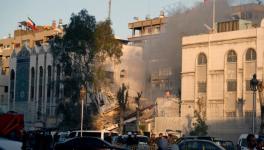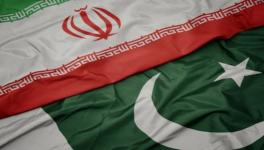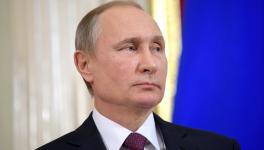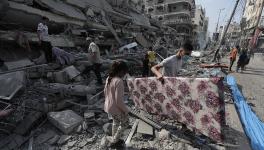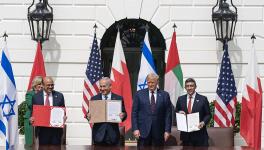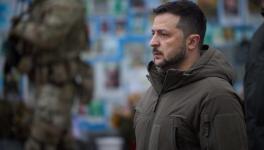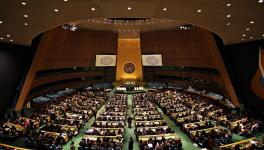ISIS, Iraq, Syria and US Objectives
Aijaz Ahmad, the well-known political commentator discusses with Newsclick the so-called rescue of the Yazidis by the US, when in reality, on the ground it was Kurdish forces -- PKK forces from Turkey and YPG from Syria -- who had come to their rescue. Aijaz believes that the US wanted a change of guard -- replacing al Maliki with Haider al Abadi, and refusing to aid the Baghdad forces against IS before was a part of this plan. he also felt that though the current fighting is a danger to the Mosul Dam, held to be the most dangerous dam in the world, ISIS or IS, would not be able to hold it for long. . Aijaz also pointed out the recent concessions that Iran has made to the US and that this indicates a tacit understanding in Iraq of Iran, Baghdad forces and the US against IS. He suggested that chances are that IS would now turn to Syria for its next set of targets, where the US still seems to want a regime change. Despite the rise of forces such as IS, which could be against the interests of the US, the longterm objectives of the US to remake this whole region into a patchwork of ethnic and religious states still continues.
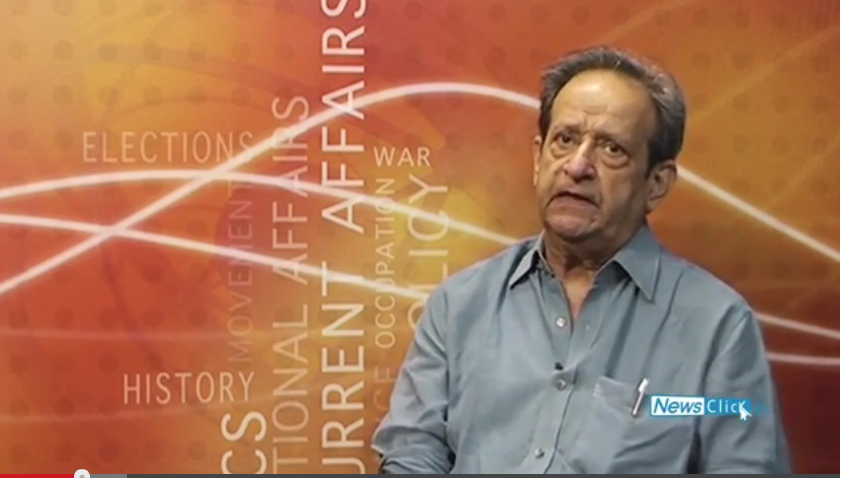
Rough Transcript:
Prabir Purkayastha (PP): hello and welcome to Newsclick. The Islamic state of Iraq and Al-sham, ISIS has now transformed itself into a Caliphate and is talking about its own independent state. It has taken over parts of Iraq, parts of Syria and recently we saw Yazidis being attacked, their towns taken over and a huge exodus of them to Sinjar mountains. To discuss the current situation in Iraq and Syria we have Professor Aijaz Ahmad with us, a well known political commentator. Aijaz, good to have you back with us.
Aijaz Ahmad (AA): Very good to come back.
PP: The recent picture that has been given is that the strikes of the U.S really saved the Yazidis . The role of the Kurds in the media seems to have been completely blacked out. The PKK and YPG were on the ground, fighting taking over the towns from the IS in order to save the Yazidis and air strikes that U.S did, was more to save Erbil. Do you think this is part of US grandstanding, or the U.S attempt not to draw attention to the fact that PKK is an important player over here?
AA: Well I think there are 3 or 4 different issues here that we don’t know very much about. One I am very interested in the fact that these very people have been doing worst things on a grandeur scale against various minorities in Syria and Iraq. Why do the Americans at a certain point become so worked about Yazidis? Just before that all the Iraqi Christians went through hell. Before that Syrian Christians and so on, number of minorities in last two or three years. Why Yazidis at this point? That is one question. Second question that is very interesting to me is why were the Peshmerga’s withdrawn and I believe the were withdrawn. The story goes out that the Peshmerga’s were out gunned and I don’t believe that is true. Why were they withdrawn and instead PKK and the Syrian Kurds came forward and did that and third thing that interests me is that, you look at the map where ISIS is most powerful then now getting to the point then now getting to the point where they are closer and closer to the Iranian border. So that. ultimately the question of timing, why now; which is what my question is. My sense is that the Americans have been working on the exit of Maliki and these bombings are synchronized with that arrangement having been made. Now we know in all senses Maliki, from any progressive point of view he was a dreadful fellow. But there was one thing in 2011 he refused to give the Americans the terms that they wanted to keep their forces in Iraq specially not giving them impunity. Now my sense is that these bombings are a prelude to the resurrection of that very agreement which the new Prime Minister of designated Iraq might very well start negotiating, may eventually even sign and that would be the condition for the Americans and this is the reason now being given the Mosul Dam etc.
PP: So you think it’s the path of the change of the guard that this helped to bring about for the Americans: departure of Maliki?
AA: I think that’s what the timing is. They didn’t come in earlier because then they would have been committed to it and that would have actually strengthened Maliki. So it didn’t matter what happens to the Christians, the Christians might have been killed; and now they become the human rights protectors of the Yazidis, having not protected anybody until now.
PP: The Mosul dam: that’s a very interesting and a very dangerous situation, irrespective of what other political implications are. Because Mosul dam stands on a foundation that is continuously weakened as it dissolves; and it has to be grouted always. If it breaks, half a million people could die, even Baghdad would be underwater, it is downstream riparian, as you know. Fighting over the Mosul dam, do you think we have entered a very dangerous phase in this particular war?
AA: This is a very important strategic objective for the both sides. ISIS is crazy enough to do something of that kind, I do believe. At the very same time they seem to be militarily very shrewd people. If they come to control it they can make all kinds of threats. So it’s very strategic.
PP: Aijaz there is a bigger danger, even if they don’t make any threat, they don’t do anything, their inability to actually continue the grouting operation is relatively dangerous.
AA: Quite right. My sense is that ISIS is not going to last very long.
PP: They have taken it back they claim.
AA: Once the Americans have achieved their objectives, ISIS can also be regrouped and sent towards Iran.
PP: that’s the other thing you know. If you see the whole scenario, now ISIS has the possibility of striking towards Damascus or Aleppo. These are the two strategic objectives and Americans will not be too bothered if they struck towards Aleppo; they essentially would like it -- seems. The ISIS could turn towards Syria and as you are saying -- they have achieved regime change in Iraq, leaving it more at peace. Do you think that’s the likely scenario?
AA: We don’t know what the real relationship that the ISIS and the Americans are. We know that ISIS is a creation of their friends Qataris and Turks and so on. How much coordination there is between the two of them we don’t know. What we do know is that there is a strategic convergence. The interest of the ISIS happen to converge with that of U.S. That is why I believe that ISIS would not move towards Kurdistan. Erbil is not the target and now that the Americans have achieved what they have achieved in Baghdad its very likely that Baghdad will not be the next target either. May be because of coordination or because ISIS will understand that if we go that way Americans will come in full force. Either way they will achieve that. That leaves us where is ISIS going to go. Yes, I do think that Americans, it is in everyone’s interest that ISIS realises the danger of the possible strike against Baghdad, turn and go back to Syria where they have stepped up the fighting already. That is very very likely. What is going on, I don’t know Prabir, it is very early to say. But I want to bring in the question of Iran again and again. Over the last few weeks Iran has conceded a lot to the Americans. I think they are feeling deeply threatened by the ISIS showing up at their borders. What the strategic details of it are I don’t know. The question of the two of them coming together on the question of Maliki.
PP: ...two of the you mean United States and Iran.
AA: the coming together on the question of Maliki’s I believe a concession by them to the Americans. It's a concession to the United States. The Iranis are making all kinds of gestures to Europe to have a gas pipelines from Iran through Turkey to Europe which will bypass, which will relieve the EU from its dependence from Russia and so on.
PP: Do you think that there is a possibility of now Syria, Iraq, Iran joining hand to fight ISIS and with passive support from United States or you think that United States will still like the war to continue in this form. Will that keep the grip over the region more firm.
AA: You see my sense is that American as you show have conflicting interests and conflicting tactics if you wish to put it that way but whichever way it works the destructive power is such that part of their objective they will always be achieved. Now having somebody that they have brought to power in Baghdad, my sense is that it will strengthen their resolve to overthrow Bashar al-Assad and that will prevent the kind of regional alignment you are wondering about.
PP: Iran, Syria and Hezbollah the three are anyway together. It’s really Iraq which plays some role by helping Syria and helping Hezbollah allowing Iran arms to go through. You think that might stop essentially.
AA: Essentially, I think, they are trying very hard (to stop this).
PP: it does appear that this kind of regional alignment is not going to be supported by the United States, that is one and secondly there is no change in policy that we can see from Turkey and Saudi Arabia. So which are as you said earlier are tacit backers of ISIS. So this war is going to continue for quite sometime.
AA: Quite right and now again there is a deep contradiction in Saudi policy. On the one hand they want these Wahabis, Takfiris, the extreme Takfiris and use them against the shia which ultimately means Iraq and I think this push towards the Iranian border is much more Saudi pressure and Qatari pressure and more than that Saudi pressure. So they cannot break with these people and at the same time they are scared that if these people really succeed their own monarchies will finally be on the line. So it’s a very very confused moment in terms of the contradictions of both the Saudi and American policies and we have to watch where it goes.
PP: Also interesting that finally the pretense of the so called moderate Islamic forces, who are supposed to be the ones that they should support that seems to have fallen apart. The free Syrian army has virtually given up saying its units have defected to the ISIS. So we have really an Al-Qaida formation or an ISIS, take your pick.
AA: I think one of the problems that the great vacuum in the American foreign policy is that they were banking the Muslim Brotherhood to stabilize its power everywhere. Now the only place Muslim Brotherhood is still holding on in an spectacular fashion is Turkey. Interestingly where no one talks about the fact that these are Muslim Brotherhood people; everything else has collapsed. So they don’t know what to do. What I believe , immediate objective is to strengthen their military presence in Iraq, contain ISIS, turn it back towards Syria, create more mayhem in Syria and then at some later point figure out what they are going to do with Syria. I don’t think they have a clear objective in Syria at the moment.
PP: Essentially reconfiguration of the forces whether Americans like it or not is going on in the region and with the IS or ISIS we have a really a three way split of Iraq which is de-facto on ground today and we have to see what happens in Syria and what Americans, Turkish and Saudis who have been the ones stirring the pot will do. That’s the scenario as we see. Is that right?
AA: Yes, by and large, ISIS now has, I suppose, something like 30% of the Iraqi territory is under their control. Their power belt is the belt under Kurdistan from one end to other what separates them from Iran is Kurdistan. So they have to somehow come down around Kurdistan and if they are going to go into this Shia-Sunni confrontation.
PP: Thank you Aijaz, I think that’s a very fluid situation. Politics are changing very rapidly within the region. Newsclick will continue to watch what's happening and come back to you on this again.
Thank you very much.
AA: Thank you.
Get the latest reports & analysis with people's perspective on Protests, movements & deep analytical videos, discussions of the current affairs in your Telegram app. Subscribe to NewsClick's Telegram channel & get Real-Time updates on stories, as they get published on our website.









